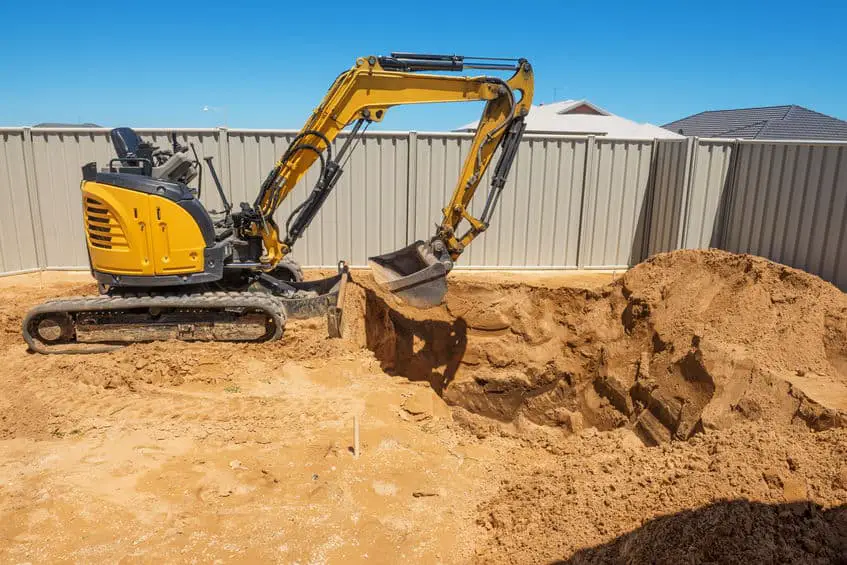You have three main options for a salt water pool in terms of the design: Vinyl, fiberglass or concrete. And for each of those three types there are of course many shapes, designs, sizes, and depths to choose from.
When comparing vinyl vs fiberglass vs concrete pool options, which is the best and which should you choose? Let’s take a closer look at the pros and cons of each option.
Vinyl vs Fiberglass vs Concrete Pool
Vinyl Salt Water Pool

Our salt water pool is a vinyl one. The floor of the pool is built with ermiculite or grout and the walls are built of hard plastic, steel or aluminum. A vinyl cover goes over the entire structure to provide a softer surface to walk on and swim in. The vinyl liners come in many colors and designs with blue being the one most people tend to go with.
Pros
- Vinyl pools are quick to install usually in 2 weeks or so depending on the size, complexity, etc.
- Given their widespread availability and history, easy to find parts, equipment and service.
- Tends to be the cheapest of the three options in terms of the up front cost.
- Very customizable in terms of size, depth, shape and color (vinyl color).
Cons
- Vinyl liners need to be replaced every 5-9 years typically. Older liners lasted longer but newer environmental regulations have caused the lifespan of newer liners to decrease.
- Vinyl liners can pull away from the wall causing water to get behind the liner which needs to be pumped out.
- Vinyl can rip, tear and can cause leaks which have to be repaired quickly.
- Over time, liner color fades due to direct sunlight and can stain from leaves, chemicals, etc.
- Vinyl pools tend to be more susceptible to algae growth than fiberglass.
Fiberglass Salt Water Pool

Fiberglass pools are pre-made shells that get lowered into the dug ground by a crane and then fastened and backfilled to secure it in place. Fiberglass pools are very durable, quick to install and are much easier and more comfortable to walk on than concrete. Unlike concrete, salt water systems work very well with fiberglass pools.
Pros
- Often quicker than vinyl to install since fiberglass pools are pre-made ahead of time and are lowered into the ground by crane.
- Fiberglass pools have a porous, smooth and durable surface that won’t rip like vinyl.
- Many options to choose from although since they are pre-made, you can choose from only what your chosen pool company has available.
- Tends to be low in maintenance certainly when compared to concrete.
Cons
- You can’t simply design the exact shape you want as pool designs are pre-made and you choose from what is available.
- Tends to be more expensive than vinyl pools in terms of up front cost.
- Since they are pre-made and need to be transported to your house on a large truck with a crane, you may find that the largest width you can get is 16 feet as US laws classify larger sizes as super loads which are more regulated to transport.
- Repairs can sometimes be difficult to match to the existing color of the fiberglass shell.
Concrete Salt Water Pool

Concrete pools are the most durable but also the most expensive, require the most maintenance and take the longest to build, several months usually. Some pool installers might not install a salt water system given the damage over time that salt does to concrete.
Pros
- Very customizable in terms of shape, depth, size, etc.
- When done right, concrete has a high class look and feel to it, moreso than some cheaper vinyl pool liners.
- Concrete – like fiberglass – is more durable than a vinyl cover which can rip, tear and fade over time.
Cons
- The most expensive option given the price of concrete and time involved to pour it.
- Takes the longest to build, up to several months, when you factor in concrete curing time.
- Concrete pools need to be drained so the the concrete can be acid-washed every few years.
- Salt water will shorten the lifespan of concrete so the pool surface needs to be professionally refinished every 10-15 years.
- High in ongoing maintenance.
- Generally has a rough surface which can be tough on the skin.
Conclusion
- Vinyl vs Fiberglass vs Concrete Pool: There are plenty of things to consider when debating which of the three options is best for you.
- For the average homeowner, a vinyl or fiberglass pool will offer you a pool with lower overall costs and maintenance and less downtown due to repairs and larger maintenance.
- Vinyl pools tend to be quick to build, relatively cost effective in terms of up front costs and when used with a salt water system, maintenance is reasonable.
- Fiberglass pools are quick to install, cost effective in terms of maintenance, durable and work well with salt water pool systems.
- Concrete pools don’t work as well with salt water systems and some pool builders may not build them this way due to the negative effect salt has on concrete over time.

